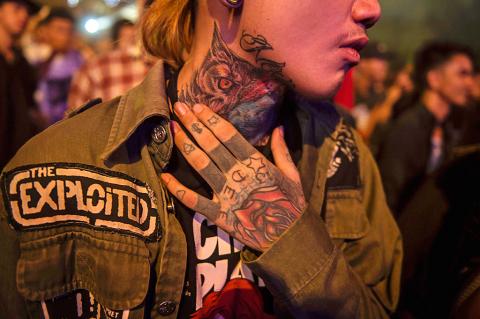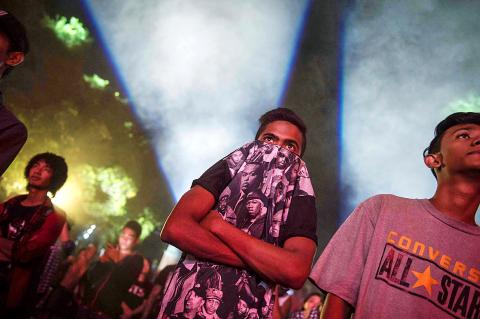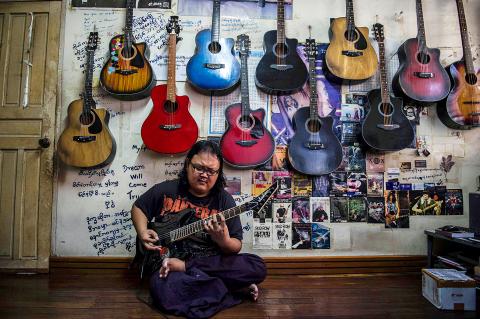Moshing and sweating, the crowd of headbangers scream their angst into the sultry Yangon night, a rare glimpse of a defiant musical subculture now crashing into the open — though sex, drugs and religion remain off the song sheet.
Half a century of repressive military rule virtually silenced Myanmar’s heavy metal scene and today its musicians are still shunned by most people in the conservative Buddhist country.
But a growing coterie of die-hard metal-heads say the aggressive, rasping music gives them a unique release in a nation still struggling to come to terms with its own dark history.

Photo: AFP/Romeo
“Listening to metal is the fucking best feeling. It is like freedom, it’s good for the soul,” 21-year-old mobile phone repairman Thaw Di Yoo told AFP at a recent gig.
“It’s different from other music, that’s why I am only a fan of metal,” he said, showing a tattoo depicting the logo of his local heroes — Nightmare Metal Band — on his arm.
For A Phyu Yaung, a 30-year-old marketing manager, metal helps her escape everyday life. “I mostly listen to metal songs when I feel stressed,” she said. “It can help chill me out when I’m feeling like that.” For years metal bands were muzzled by strict censorship laws and dissident musicians were jailed and often tortured for supporting the opposition.

Photo: AFP/Romeo
Banned music was smuggled in on tapes and CDs and an underground scene of punks and headbangers began to grow up out of sight of Myanmar’s notorious police in the 90s.
Today the arts are flourishing, but metal music is still sidelined in a country where most prefer sickly sweet pop, crooning love songs or Burmese covers of Western hip hop tracks.
‘WRITE AGAINST VIOLENCE’

Photo: AFP/Romeo
Like repressive socialist regimes in Eastern Europe and Russia, Myanmar’s junta feared the anarchist energy of heavy metal music. Censors banned anything they thought could prove a spark for revolution — from too much red or black in artworks to the mention of roses in songs, seen as a reference to democracy icon Aung San Suu Kyi.
While underground metal musicians managed to stay out of jails, their jarring sound and brooding political lyrics were publicly silenced.
“Metal is not the type of music that goes on about how much I love you and how much I miss you,” guitar instructor Myo Min Thu told AFP in his teaching room, plastered with posters of US bands like Iron Cross and Metallica.
“We could not criticize Christianity or be anti-Buddhist. Politics was the worst at that time and we faced a lot of difficulties about lyrics.”
Myanmar officially abolished censorship in 2012, the year after the junta handed power to a quasi-civilian regime.
Freedom of expression blossomed and many musicians came out in support of Suu Kyi’s NLD party as it campaigned for last year’s election, the first free vote in a generation. Today Myanmar’s heavy metal bands are still too coy to touch on topics like sex and death considered taboo in conservative Myanmar — in stark contrast to their peers in the West.
Instead, they are using their new-found freedom to push for social and political change.
“In our new album, we mostly write about politics and the situation in the country,” said Last Days of Beethoven guitarist Phoe Zaw, 32.
“We write against... violence against Muslim people and Buddhist people in Rakhine state, violence against ethnic people in (other) states.”
SOCIAL MEDIA EXPLOSION
Still, hardcore metal remains a niche genre.
While the number of bands has grown since the end of junta rule, there are still only a few dozen in Yangon and a handful in the rest of the country of more than 50 million. Not many venues will put on metal gigs and bands struggle to find sponsors who will pay for the high-level sound systems they need, while few shops stock the rare albums that make it onto labels.
“There are only a few shows here. I can count on my fingers the number of shows in a year,” said Phoe Zaw.
“Very few people (organizers) want to hold underground shows, metal shows.”
But bands say the explosion of social media over the past few years has helped to bring them into the limelight. Now they post their music online instead of handing out CDs in teashops and on the street, and fans can share songs without having to wait for them to be formally released.
For musicians who have struggled for years to be heard, the online revolution is offering a new hope.
“I think metal music is becoming more popular in Myanmar now,” said Aung Myo Linn, from Nightmare Metal Band.
“Technology and the Internet is helping as we can share songs through social media like Facebook, YouTube and others, even if we cannot produce albums.”

That US assistance was a model for Taiwan’s spectacular development success was early recognized by policymakers and analysts. In a report to the US Congress for the fiscal year 1962, former President John F. Kennedy noted Taiwan’s “rapid economic growth,” was “producing a substantial net gain in living.” Kennedy had a stake in Taiwan’s achievements and the US’ official development assistance (ODA) in general: In September 1961, his entreaty to make the 1960s a “decade of development,” and an accompanying proposal for dedicated legislation to this end, had been formalized by congressional passage of the Foreign Assistance Act. Two

Despite the intense sunshine, we were hardly breaking a sweat as we cruised along the flat, dedicated bike lane, well protected from the heat by a canopy of trees. The electric assist on the bikes likely made a difference, too. Far removed from the bustle and noise of the Taichung traffic, we admired the serene rural scenery, making our way over rivers, alongside rice paddies and through pear orchards. Our route for the day covered two bike paths that connect in Fengyuan District (豐原) and are best done together. The Hou-Feng Bike Path (后豐鐵馬道) runs southward from Houli District (后里) while the

The Taipei Times last week reported that the Control Yuan said it had been “left with no choice” but to ask the Constitutional Court to rule on the constitutionality of the central government budget, which left it without a budget. Lost in the outrage over the cuts to defense and to the Constitutional Court were the cuts to the Control Yuan, whose operating budget was slashed by 96 percent. It is unable even to pay its utility bills, and in the press conference it convened on the issue, said that its department directors were paying out of pocket for gasoline

On March 13 President William Lai (賴清德) gave a national security speech noting the 20th year since the passing of China’s Anti-Secession Law (反分裂國家法) in March 2005 that laid the legal groundwork for an invasion of Taiwan. That law, and other subsequent ones, are merely political theater created by the Chinese Communist Party (CCP) to have something to point to so they can claim “we have to do it, it is the law.” The president’s speech was somber and said: “By its actions, China already satisfies the definition of a ‘foreign hostile force’ as provided in the Anti-Infiltration Act, which unlike